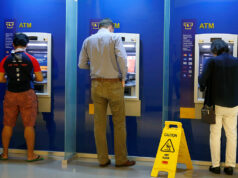Yields on gov’t debt rise on inflation
YIELDS ON government securities (GS) went up last week as inflation continued to pick up to reach a two-year high in January.
GS yields, which move opposite to prices, rose by a week-on-week average of 6.13 basis points (bps), based on the BVAL Reference Rates published on the Philippine Dealing System’s website as of Feb. 11.
Financial markets were closed on Friday in observance of Chinese New Year.
Yields on benchmark tenors increased on Thursday from their Feb. 5 finish, except for those on the 91- and 182-day Treasury bills (T-bills), which declined by 6.64 bps and 5.55 bps, respectively, to 0.9744% and 1.1489%.
Meanwhile, the rate on the 364-day T-bills edged up by 1.66 bps to 1.4323%.
At the belly of the curve, yields on the two-, three-, four-, five-, and seven-year Treasury bonds (T-bonds) rose by 8 bps (to 1.8632%), 9.64 bps (2.1702%), 8.97 bps (2.43%), 7.40 bps (2.6386%), and 5.74 bps (2.8842%), respectively.
At the long end, the 10-, 20-, and 25-year papers yielded 3.1139%, 4.0656%, and 4.0736%, rising by 8.76 bps, 10.22 bps, and 19.18 bps, respectively.
“Local yields increased [last] week as the bond market mainly reacted from the stronger-than-expected inflation report for January,” a bond trader said in an e-mail.
“With inflation expected to remain on the high side in the coming months, yields have adjusted higher [last week] to cover for higher-than-expected price upticks,” First Metro Asset Management, Inc. (FAMI) said in a separate e-mail.
The Philippine Statistics Authority reported earlier this month that January inflation rose for the fourth consecutive month to a two-year high of 4.2%, faster than the 3.5% pace recorded last December as well as the 2.9% a year ago, amid surging food and transport prices.
“As BSP views the uptrend in inflation as transitory, policy rates were kept unchanged. The successful implementation of price caps and relaxation in imports to address the supply shocks is crucial to anchor inflation expectations,” FAMI said.
The three- to five-year bonds saw some volatility following the government’s ongoing offer of fresh retail Treasury bonds (RTBs) that were priced at 2.375% last week, it added.
The Bureau of the Treasury on Tuesday raised an initial P221.218 billion from the three-year RTB during the rate-setting auction. The papers due 2024 attracted tenders worth P284.183 billion, above the P30-billion program, and fetched a rate of 2.375%.
These bonds, which target individual and retail investors, are being offered in denominations of P5,000. These notes will be issued on March 9 and will mature on March 9, 2024.
The government plans to borrow nearly P3 trillion this year from foreign and domestic lenders to help plug its budget deficit seen to hit 8.9% of the country’s economic output.
“In the near term, GS yields will likely continue trading range-bound as market participants focus on the RTB 3-11 issuance and digest comments from the BSP’s (Bangko Sentral ng Pilipinas) policy decision meeting [last Thursday],” FAMI said.
The central bank on Thursday kept benchmark interest rates at record lows to support the Philippine economy’s recovery from the coronavirus pandemic.
In its first policy setting for the year, the Monetary Board maintained the overnight reverse repurchase rate at its record low of 2%. The lending and deposit facilities were likewise kept at 2.5% and 1.5%, respectively.
However, the central bank revised the 2021 inflation average forecast upwards to 4%, hitting the upper end of its 2-4% target for the year, from 3.2% previously amid soaring food prices.
The BSP, meanwhile, trimmed its inflation forecast for next year to 2.7% from 2.9% previously.
“The upward revision of BSP’s inflation forecast for 2021 at 4% from 3.2% seemed to support views of elevated short-term inflation which might push local bond yields slightly higher,” the bond trader said. — Jobo E. Hernandez



